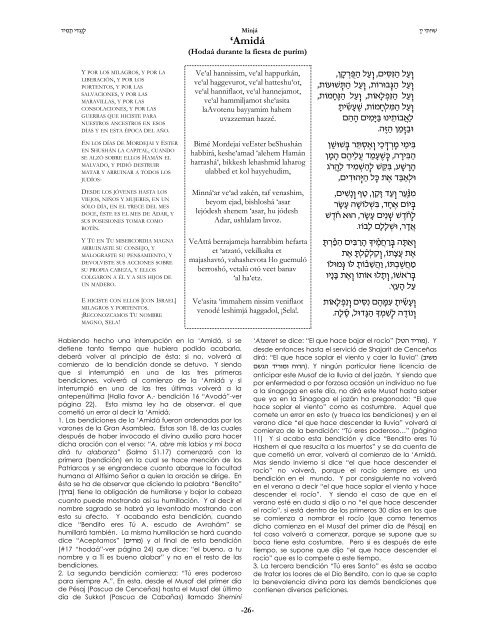libro-tradicional-judio-de-oraziones-y-bendiziones - Yad beYad
libro-tradicional-judio-de-oraziones-y-bendiziones - Yad beYad
libro-tradicional-judio-de-oraziones-y-bendiziones - Yad beYad
Create successful ePaper yourself
Turn your PDF publications into a flip-book with our unique Google optimized e-Paper software.
ci ¦n¨z i C§b¤pèl ¦Minjá‘Amidá(Hodaá durante la fiesta <strong>de</strong> purím)ï§i i ¦z¦iE ¦WY POR LOS MILAGROS, Y POR LALIBERACIÓN, Y POR LOSPORTENTOS, Y POR LASSALVACIONES, Y POR LASMARAVILLAS, Y POR LASCONSOLACIONES, Y POR LASGUERRAS QUE HICISTE PARANUESTROS ANCESTROS EN ESOSDÍAS Y EN ESTA ÉPOCA DEL AÑO.DESDE LOS JÓVENES HASTA LOSVIEJOS, NIÑOS Y MUJERES, EN UNSÓLO DÍA, EN EL TRECE DEL MESDOCE, ÉSTE ES EL MES DE ADAR, YSUS POSESIONES TOMAR COMOBOTÍN.Y TÚ EN TU MISERCORDIA MAGNAARRUINASTE SU CONSEJO, YMALOGRASTE SU PENSAMIENTO, YDEVOLVISTE SUS ACCIONES SOBRESU PROPIA CABEZA, Y ELLOSCOLGARON A ÉL Y A SUS HIJOS DEUN MADERO.EHICISTE CON ELLOS [CON ISRAEL]MILAGROS Y PORTENTOS.¡RECONOZCAMOS TU NOMBREMAGNO, SELA!Ve‘al hannissim, ve‘al happurkán,ve‘al haggevurot, ve‘al hatteshu‘ot,ve‘al hanniflaot, ve‘al hannejamot,ve‘al hammiljamot she‘asitalaAvotenu bayyamim hahemuvazzeman hazzé.Bimé Mor<strong>de</strong>jai veEster beShushánhabbirá, keshe‘amad ‘alehem Hamánharrashá‘, bikkesh lehashmid laharogulabbed et kol hayyehudim,Minná‘ar ve‘ad zakén, taf venashim,beyom ejad, bishloshá ‘asarlejó<strong>de</strong>sh shenem ‘asar, hu jó<strong>de</strong>shAdar, ushlalam lavoz.VeAttá berrajameja harrabbim hefartaet ‘atzató, vekilkalta etmajashavtó, vahashevota l . lo guemulóberroshó, vetalú otó veet banav‘al ha‘etz.Ve‘asita ‘immahem nissim veniflaotvenodé leshimjá haggadol, ¡Sela!.,oẅ§ xªR©d l©rèe ,mi ¦Q¦P©d l©rèe,zFrEW èY©d l©rèe ,zFxEaèB©d l©rè e,zFn¨g¤P©d l©rèe ,zF`¨l §t¦P©d l©rè e¨zi ŦU¨r¤W ,zFn¨g§l¦O©d l©rèem¥d¨d mi ¦nÏ©A Epi ¥zFa£`©l.d¤G©d o©nèG©aEo ©WEWèA x¥Y§q¤`èe i©kè C§ x’n i¥ni¦Ao¨n¨d m¤di¥l£r c©n¨r¤WèM ,d¨ xi¦A©dbŸx£d«©l ci¦n§W©dèl W¥T¦A ,rẄ¨ x¨d,mi¦ cEdèI©d l’M z¤` c¥A©`§lE,mi¦W¨pèe s©h ,o¥w¨f c©rèe x©rÅ «©P¦nxܨr dẄFl §W¦A ,c¨g¤` mFi èAW¤cÅ Ÿg `Ed ,xܨr mi¥p èW W¤cÅ Ÿgèl.fFa¨l m¨l¨l §WE ,x¨c£`Ÿ§ x Å©t¥d mi¦A© x¨d L i Ťn£g xèA © dŸ©`èez¤` Ÿ§l Å©w§l¦wè e ,Fz¨v£r z¤`FlEnèB FN ¨zFÅa¥W£d©e ,FY §a ©W£g©nei¨pÄ z¤`èe FzF` El¨zèe ,FW`Ÿx èA.u¥r¨d l©rzF`¨l §t¦pè e mi ¦Q¦p m¤dÖ¦r ¨zi ŦU¨rèe. d¨l q Ť ,lEc¨B©d L§n¦Wèl d¤cFp èeHabiendo hecho una interrupción en la ‘Amidá, si se<strong>de</strong>tiene tanto tiempo que hubiera podido acabarla,<strong>de</strong>berá volver al principio <strong>de</strong> ésta; si no, volverá alcomienzo <strong>de</strong> la bendición don<strong>de</strong> se <strong>de</strong>tuvo. Y siendoque si interrumpió en una <strong>de</strong> las tres primerasbendiciones, volverá al comienzo <strong>de</strong> la ‘Amidá y siinterrumpió en una <strong>de</strong> las tres últimas volverá a laantepenúltima (Halla favor A.- bendición 16 “Avodá”-verpágina 22). Esta misma ley ha <strong>de</strong> observar, el quecometió un error al <strong>de</strong>cir la ‘Amidá.1. Las bendiciones <strong>de</strong> la ‘Amidá fueron or<strong>de</strong>nadas por losvarones <strong>de</strong> la Gran Asamblea. Estas son 18, <strong>de</strong> las cuales<strong>de</strong>spués <strong>de</strong> haber invocado el divino auxilio para hacerdicha oración con el verso: “A. abre mis labios y mi bocadirá tu alabanza” (Salmo 51.17) comenzará con laprimera (bendición) en la cual se hace mención <strong>de</strong> losPatriarcas y se engran<strong>de</strong>ce cuanto abarque la facultadhumana al Altísimo Señor a quien la oración se dirige. Enésta se ha <strong>de</strong> observar que diciendo la palabra “Bendito”(jexa) tiene la obligación <strong>de</strong> humillarse y bajar la cabezacuanto pue<strong>de</strong> mostrando así su humillación. Y al <strong>de</strong>cir elnombre sagrado se habrá ya levantado mostrando conesto su afecto. Y acabando esta bendición, cuandodice “Bendito eres Tú A. escudo <strong>de</strong> Avrahám” sehumillará también. La misma humillación se hará cuandodice “Aceptamos” (micen) y al final <strong>de</strong> esta bendición(#17 “hodaá”-ver página 24) que dice: “el bueno, a tunombre y a Tí es bueno alabar” y no en el resto <strong>de</strong> lasbendiciones.2. La segunda bendición comienza: “Tú eres po<strong>de</strong>rosopara siempre A.”. En esta, <strong>de</strong>s<strong>de</strong> el Musaf <strong>de</strong>l primer día<strong>de</strong> Pésaj (Pascua <strong>de</strong> Cenceñas) hasta el Musaf <strong>de</strong>l últimodía <strong>de</strong> Sukkot (Pascua <strong>de</strong> Cabañas) llamado SheminíEN LOS DÍAS DE MORDEJAI Y ESTEREN SHUSHÁN LA CAPITAL, CUANDOSE ALZÓ SOBRE ELLOS HAMÁN ELMALVADO, Y PIDIÓ DESTRUIRMATAR Y ARRUINAR A TODOS LOSJUDÍOS--26-‘Atzeret se dice: “El que hace bajar el rocío” (lhd cixen). Y<strong>de</strong>s<strong>de</strong> entonces hasta el servició <strong>de</strong> Shajarit <strong>de</strong> Cenceñasdirá: “El que hace soplar el viento y caer la lluvia” (aiynmybd cixene gexd). Y ningún particular tiene licencia <strong>de</strong>anticipar este Musaf <strong>de</strong> la lluvia al <strong>de</strong>l jazán. Y siendo quepor enfermedad o por forzosa ocasión un individuo no fuea la sinagoga en este día, no dirá este Musaf hasta saberque ya en la Sinagoga el jazán ha pregonado: “El quehace soplar el viento” como es costumbre. Aquel quecomete un error en esto (y trueca las bendiciones) y en elverano dice “el que hace <strong>de</strong>scen<strong>de</strong>r la lluvia” volverá alcomienzo <strong>de</strong> la bendición: “Tú eres po<strong>de</strong>roso…” (página11) Y si acabo esta bendición y dice “Bendito eres TúHashem el que resucita a los muertos” y se da cuenta <strong>de</strong>que cometió un error, volverá al comienzo <strong>de</strong> la ‘Amidá.Mas siendo invierno si dice “el que hace <strong>de</strong>scen<strong>de</strong>r elrocío” no volverá, porque el rocío siempre es unabendición en el mundo. Y por consiguiente no volveráen el verano a <strong>de</strong>cir “el que hace soplar el viento y hace<strong>de</strong>scen<strong>de</strong>r el rocío”. Y siendo el caso <strong>de</strong> que en elverano esté en duda si dijo o no “el que hace <strong>de</strong>scen<strong>de</strong>rel rocío”, si está <strong>de</strong>ntro <strong>de</strong> los primeros 30 días en los quese comienza a nombrar el rocío (que como tenemosdicho comienza en el Musaf <strong>de</strong>l primer día <strong>de</strong> Pésaj) ental caso volverá a comenzar, porque se supone que suboca tiene esta costumbre. Pero si es <strong>de</strong>spués <strong>de</strong> estetiempo, se supone que dijo “el que hace <strong>de</strong>scen<strong>de</strong>r elrocío” que es lo compete a este tiempo.3. La tercera bendición “Tú eres Santo” es ésta se acaba<strong>de</strong> tratar los loores <strong>de</strong> el Dio Bendito, con lo que se captala benevolencia divina para las <strong>de</strong>más bendiciones quecontienen diversas peticiones.


